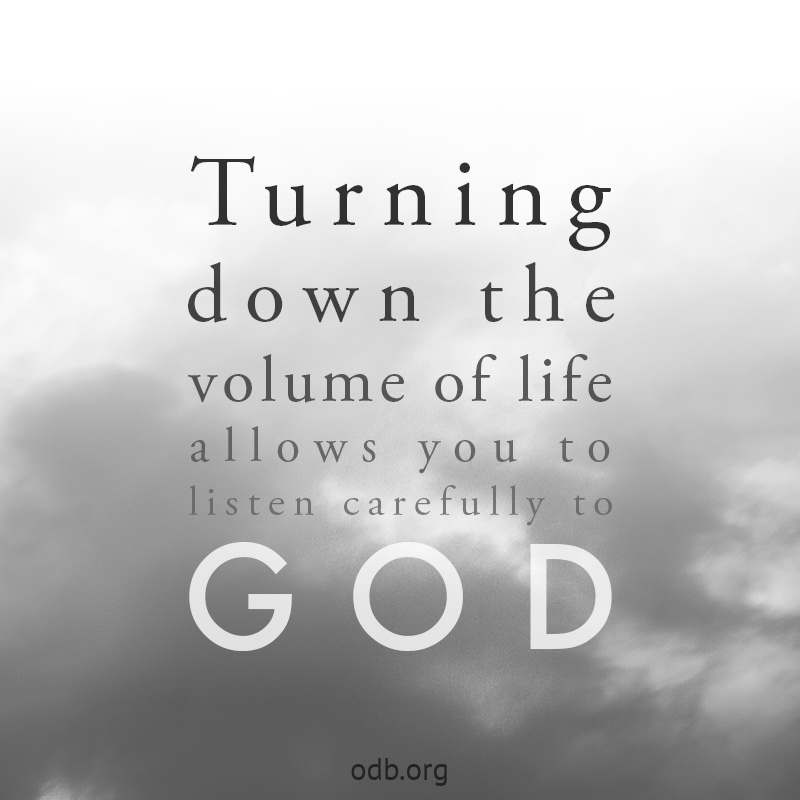Purpose in Routine
A rolling-ball clock in the British Museum struck me as a vivid illustration of the deadening effects of routine. A small steel ball traveled in grooves across a tilted steel plate until it tripped a lever on the other side. This tilted the plate back in the opposite direction, reversed the direction of the ball and advanced the clock hands. Every year, the steel ball traveled some 2,500 miles back and forth, but never really went anywhere.
It’s easy for us to feel trapped by our daily routine when we can’t see a larger purpose. The apostle Paul longed to be effective in making the gospel of Christ known. “I do not run like someone running aimlessly; I do not fight like a boxer beating the air” (1 Cor. 9:26 niv). Anything can become monotonous—traveling, preaching, teaching, and especially being confined in prison. Yet Paul believed he could serve Christ his Lord in every situation.
Routine becomes lethal when we can’t see a purpose in it. Paul’s vision reached beyond any limiting circumstance because he was in the race of faith to keep going until he crossed the finish line. By including Jesus in every aspect of his life, Paul found meaning even in the routine of life.
And so can we.

The Power of Words
Nelson Mandela, who opposed the South African apartheid regime and was imprisoned for almost 3 decades, knew the power of words. He is often quoted today, but while in prison his words could not be quoted for fear of repercussion. A decade after his release he said: “It is never my custom to use words lightly. If 27 years in prison have done anything to us, it was to use the silence of solitude to make us understand how precious words are, and how real speech is in its impact on the way people live and die.”
King Solomon, author of most of the Old Testament book of Proverbs, wrote often about the power of words. He said, “Death and life are in the power of the tongue” (Prov. 18:21). Words have the potential to produce positive or negative consequences (v. 20). They have the power to give life through encouragement and honesty or to crush and kill through lies and gossip. How can we be assured of producing good words that have a positive outcome? The only way is by diligently guarding our hearts: “Above all else, guard your heart, for everything you do flows from it” (4:23 niv).
Jesus can transform our hearts so that our words can truly be their best—honest, calm, appropriate, and suitable for the situation.

When Things Don’t Go Well
The first words that many people like to quote when misfortune hits are: “We know that all things work together for good to those who love God, to those who are the called according to His purpose” (Rom. 8:28). But that’s hard to believe in hard times. I once sat with a man who had lost his third son in a row, and I listened as he lamented, “How can this tragedy work for my good?” I had no answer but to sit silently and mourn with him. Several months later, he was thankful as he said, “My sorrow is drawing me closer to God.”
Tough as Romans 8:28 may be to understand, countless testimonies give credence to the truth of it. The story of hymn writer Fanny Crosby is a classic example. The world is the beneficiary of her memorable hymns, yet what worked together for good was born out of her personal tragedy, for she became blind at the age of 5. At only age 8, she began to write poetry and hymns. Writing over 8,000 sacred songs and hymns, she blessed the world with such popular songs as “Blessed Assurance,” “Safe in the Arms of Jesus,” and “Pass Me Not, O Gentle Savior.” God used her difficulty to bring good for her and us and glory for Him.
When tragedy befalls us, it’s hard to understand how anything good can come from it, and we won’t always see it in this life. But God has good purposes and always remains with us.

Coming Alongside
When my sister Carole was diagnosed with breast cancer, our family worried. That diagnosis, with its surgeries and treatments, caused us to fear for her well-being, which drove our family to prayer on her behalf. Over the ensuing months, Carole’s updates were honest about the challenges. But we all celebrated when the report came back that the surgery and treatments had been successful. Carole was on the road to recovery!
Then, less than a year later, my sister Linda faced the same battle. Immediately, Carole came alongside Linda, helping her understand what to expect and how to prepare for what she would face. Carole’s experience had equipped her to walk with Linda through her own trial.
This is what Paul calls for in 2 Corinthians 1:3-4, where we read, “Blessed be the God and Father of our Lord Jesus Christ, the Father of mercies and God of all comfort, who comforts us in all our tribulation, that we may be able to comfort those who are in any trouble, with the comfort with which we ourselves are comforted by God.”
Thankfully, the Lord doesn’t waste anything. Our struggles not only give us an opportunity to experience His comfort, but they also open the door for us to share that comfort with others in their struggles.

Turn It Off
When our kids were young, we took a trip to northern Wisconsin to visit my grandparents. They didn’t get very good reception on their television, but TV wasn’t much of a priority with them. After I had seen our son Scott fiddling with the TV set for a while, he asked with frustration, “What do you do if you can get only one channel and you don’t like what’s on that one?”
“Try turning it off, ” I said with a smile. Not exactly the advice he was hoping for. It’s even more difficult to do now, especially when there are so many devices that entertain, inform, and distract us.
Sometimes we do need to just turn it all off and rest our minds for a little while; we simply need to “unplug.” Jesus often drew aside for a time—especially when He wanted to take time to pray (Matt. 14:13). He encouraged the disciples to step away as well—even for a brief time (Mark 6:31). That kind of solitude and time for reflection is beneficial for each of us. In those moments we are able to draw near to God.
Follow the example and wisdom of Christ. Get away by yourself and “rest a while.” It will be good for your body, mind, and spirit.
